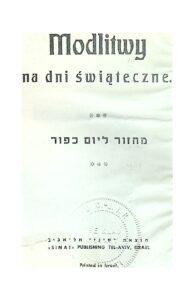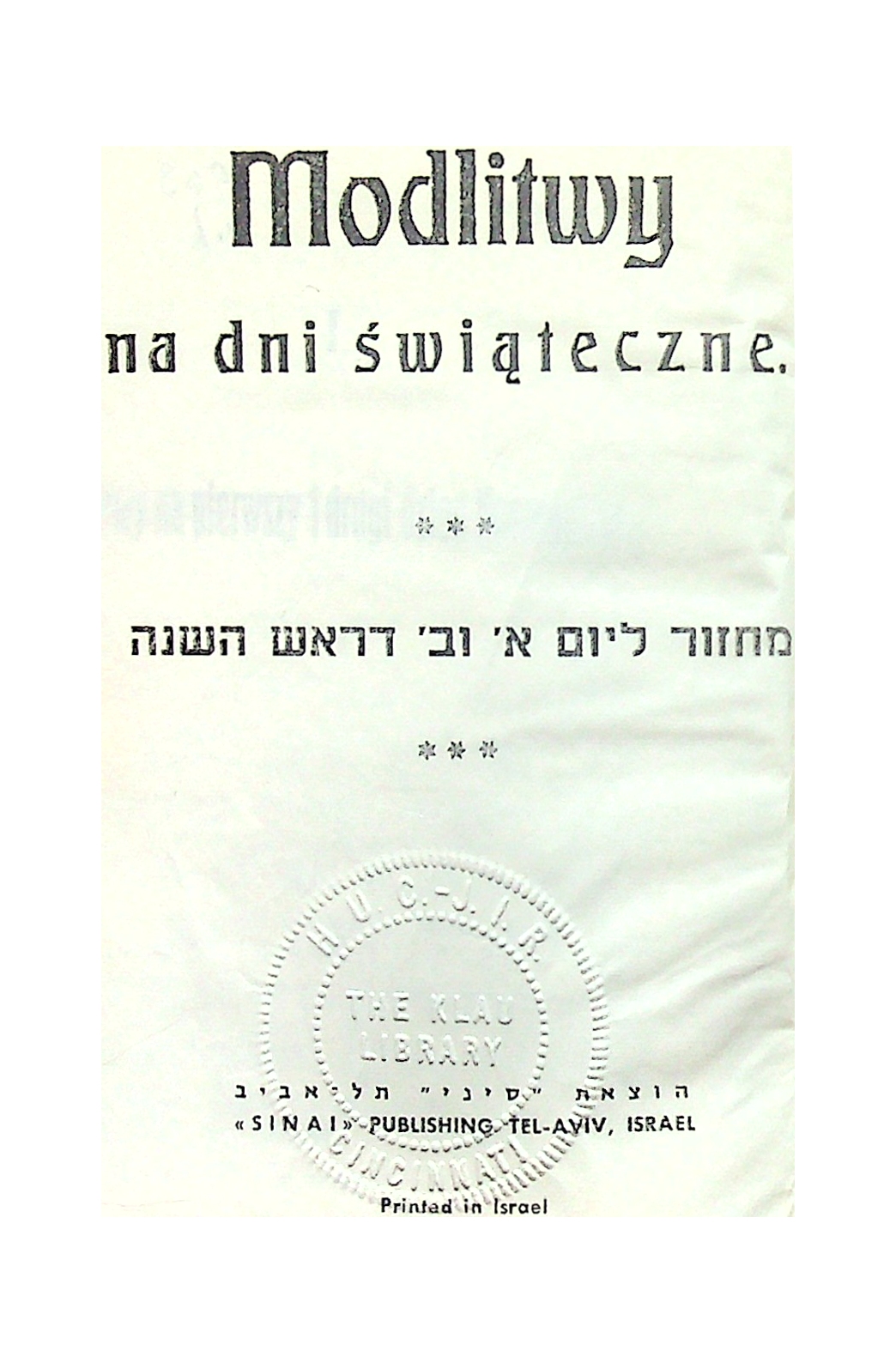Contributor(s): Shared on: Categories: Tags: Modlitwy Na Dni Świąteczne (Prayers for the Holidays) is a bilingual Hebrew-Polish set of maḥzorim (festival prayer books) re-printed in 1963 by “Sinai” Publishing (Tel-Aviv) from the 1912 edition compiled by Rabbi Bernard Dov Hausner (1874-1938). This is his maḥzor for Yom Kippur. No attribution is given to the translator or original publication from which the translation (and liturgy) were copied. No copyright notice appears on the verso of the title. There is no preface or Table of Contents or preface offered by the compiler. We are grateful to Chajm Guski for identifying Rabbi Bernard Hausner as the original compiler of the maḥzor, as found here. This work is in the Public Domain according to the 1994 Uruguay Round Agreements Act due to the expiration of the term of copyright in its home country (50 years after publication in Poland). This work was scanned by Aharon Varady for the Open Siddur Project from a volume held in the collection of the HUC Klau Library, Cincinnati, Ohio. (Thank you!) This work is cross-posted to the Internet Archive, as a repository for our transcription efforts. Scanning this work (making digital images of each page) is the first step in a more comprehensive project of transcribing each prayer and associating it with its translation. You are invited to participate in this collaborative transcription effort!
Aharon Varady, founding director of the Open Siddur Project, is a copyright researcher and amateur book scanner. He prepares digital images and new digital editions of prayer books and related works in the Public Domain in order to make their constituent parts (prayers, translations, annotations, etc.) publicly accessible for collaborative transcription by project volunteers. (In some cases, he finds existing digital editions prepared by others that require correction and reformatting.) If you appreciate his efforts, please send him a kind note or contribute to his patreon account.  Bernard Dov Hausner (March 11, 1874 – August 8, 1938), Chortkiv, Galicia, Austria-Hungary, was a Polish-Jewish rabbi, politician, and diplomat. He was ordained at the rabbinical seminary in Vienna and received a doctorate in philosophy from the German University in Prague. He returned to Galicia in 1903 and taught Jewish studies at the government high school in Lviv. As an administrator, he granted financial aid to poor students and started programs to encourage Galician Jews to work in crafts, industry, and agriculture and participated in Zionist activities there. When the Russians occupied Lviv from 1914 to 1916 during World War I, he became the rabbi of the city's Progressive community and acted as the representative of the city's Jews before the occupation authorities. During that time, he was also the main secretary of the Va‘adat ha-‘Ezrah, which helped the city's Jews and refugees. After the Austrians regained control of the city, he volunteered for the Austro-Hungarian Army and served as a chaplain in the Italian front. After the war, Hausner reorganized the Mizrachi, a Zionist movement organization, and helped establish school under its sponsorship. In 1921, he was elected first president of the movement in eastern Galicia, serving in that office until 1925. He was also chairman of the Jewish National Fund in Galicia from 1921 to 1924. He was elected to the Sejm in 1922, serving as a deputy there and dealing with both Jewish and general economic issues until 1927. An executive committee member of the Jewish parliamentary faction Koło, he tried to bridge the gaps between Congress Poland Zionists (who were radically opposed to the authorities) and the more compromising Galician Zionists. He resigned from all his Mizrachi positions the same year he left the Sejm, in 1927, declaring the movement needed to become a nonpolitical ideological organization within the larger Zionist movement in order to reduce polarizations between secular and Orthodox Zionists. That year Hausner was appointed Polish Commercial Representative for Palestine and Syria. He was initially stationed in Haifa, although in 1928 he was transferred to Tel Aviv. In 1932, he became the Polish Consul-General at Tel Aviv, with jurisdiction at Jaffa and authorization from Alexander K. Sloan to act as U.S. Consul at Jerusalem for Palestine and Transjordan. While in Tel Aviv, he was a sponsor and president of Palestine Polish Chamber of Commerce. In 1933, he returned to Poland to work as a councilor for the Ministry of Foreign Affairs. In 1934, he was sent to the United States as part of a mission to improve trade relations between Poland and the United States. He resigned from all his positions in the Polish government in 1935 and spent the rest of his life in Palestine. Besides these activities in public affairs, he published essays on Jewish subjects in Polish, including a Hebrew grammar, on the Polish poet Juliusz Slowacki's use of scripture, and on parallels between the Book of Job and Greek tragedy. In 1912, he made a translation of the maḥzor for Rosh Hashanah and Yom Kippur. In 1926, he published a booklet called . Sanacja Polskiego Pieniadza (Rehabilitation of Polish Currency). In 1929, he was made an officer of the Polish Order of Polonia Restituta. Read a comment / Leave a comment (moderated) Works of related interest: |












Leave a Reply